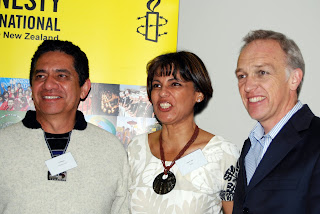 Pacific Media Centre
Pacific Media CentreAmnesty International’s New Zealand section is stepping up a new strategy focused on grave abuses of human rights in the Pacific.
And Fiji has emerged as the major target at the organisation’s national annual general meeting at AUT University this weekend.
“Demanding dignity gives Amnesty International members an unparalleled opportunity to be regionally relevant,” chief executive Patrick Holmes told delegates.
“Grave and growing human rights abuses in the Pacific region are a big concern.
“We will work to ensure dedicated human rights laws in the Pacific are on the radar.”
Amnesty’s Pacific researcher Apolosi Bose, who last month spent two weeks in Fiji on a fact-finding mission, said in a report that the regime could commit further human rights abuses now it had almost unlimited power.
He said people who were critics of the government were afraid to speak out because there was no constitution, no judiciary and the media had been censored.
Holmes said Amnesty International would work towards developing strong partnerships with local human rights groups in Pacific nations.
“Human rights is the only way to human dignity,” he said.
The organisation’s strategic plan for the next two years said the two main objectives were to focus on:
• Grave abuses of human rights in the Pacific, including New Zealand.
• Understanding and contributing to a “footprint in the Pacific”.
One of the two keynote speakers, Sacha McMeeking, law lecturer at the University of Canterbury and a member of Te Hunga Roia Māori (Māori Law Society), spoke of the “antipodean dream” and a wide belief that New Zealand had an exemplary human rights record.
“But embodying the dream means giving effect to the law,” she said. “Having an international human rights role means taking responsibility to step up and show by example.”
The 1840 Treaty of Waitangi had been a legal attempt to embody the dream by articulating rights and responsibilities on both sides.
The 1975 Waitangi Tribunal had been set up to drive things forward.
But the tribunal was only an advisory body and as it had no judicial powers, governments could ignore recommendations.
McMeeking said a challenge for these times was for New Zealand to develop a legal system that balanced protecting Māori human rights and the cultural right to survive as a people while protecting the rights of other New Zealanders.
Fiji human rights lawyer and women’s advocate Imrana Jalal spoke about the need for a regional human rights commission or agency as many smaller Pacific countries could not establish a sustainable national commission.
Picture: Governance board member Tuwhakairiora Williams, Fiji civil rights lawyer Imrana Jalal and Amnesty International Aotearoa's chief executive Patrick Holmes. Photo: Del Abcede.
Amnesty International Aotearoa New Zealand






















No comments:
Post a Comment